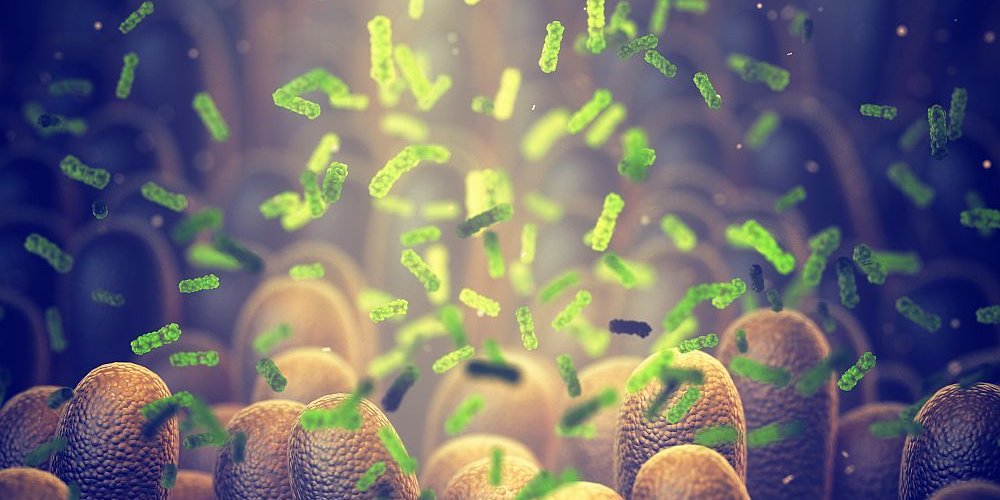Thomas Vogl, Ass.-Prof. Dr.rer.nat., BSc. MSc.
Group Leader
T: +43 (0)1 40160-57529
thomas.vogl@meduniwien.ac.at
ORCID: 0000-0002-3892-1740
Research Focus
The interplay between the immune system and microbes in cancer
In principle, our immune system is capable of detecting cancer cells, preventing tumors from growing, and even destroying them. However, cancer cells may evade the body's own defenses through new mutations. How well patients respond to certain cancer therapies therefore depends on many factors, such as their immune system and molecular properties of the tumor.
However, rather unexpected aspects of human health also influence the response to certain cancer therapies: In recent years it has been shown that immunotherapies are beneficially affected by a diverse, healthy composition of intestinal microbes. The gut microbiome refers to the collective of bacteria living in our intestines. These strains can play a significant role in activating the immune system in responding appropriately to cancer cells. The composition of the microbiome in the digestive tract, which contains by far the largest number of bacteria on the human body, can significantly influence the success of certain therapies. At the same time, however, other bacterial strains have been linked to the occurrence of certain cancers, such as colorectal cancer. How the immune system differentiates between beneficial and harmful microbes, and how these individually influence cancers, is only incompletely understood.
Dr. Thomas Vogl and his multidisciplinary team of molecular biologists, biochemists, and bioinformaticians are investigating which microbial and tumor factors are crucial for successful cancer therapies. Dr. Vogl's expertise lies in the combination of biological experiments with computer-assisted analyses. In this context, the immune system is analyzed in the laboratory using blood samples from patients alongside novel high-throughput methods.
The main focus lies on the investigation of antibody responses against the microbiome. A better understanding of the complex interaction between the intestinal microbes and our immune system could improve the prevention of cancer and pave the way towards novel therapies.
Selected Publications
Population-wide diversity and stability of serum antibody epitope repertoires against human microbiota
Vogl T., Klompus K., Leviatan S. Kalka I.N., Weinberger A., Wijmenga C., Fu J., Zhernakova A., Weersma R.K., Segal E.
Nat Med. 2021 Aug;27(8):1442-1450. doi: 10.1038/s41591-021-01409-3.
Systemic antibody responses against gut microbiota flagellins implicate shared and divergent immune reactivity in Crohn’s disease and chronic fatigue syndrome
Bourgonje A.R., Hörstke N.V., Fehringer M., Innocenti G., Vogl T.#
Microbiome, 2024 , doi.org/10.1186/s40168-024-01858-1
Systemic antibody responses against human microbiota flagellins are overrepresented in chronic fatigue syndrome (ME/CFS) patients
Vogl T.#, Kalka I.N., Klompus S., Leviatan S., Weinberger A., Segal E.#.
# Corresponding author
Sci Adv 2022 Sep 23;8(38):eabq2422. doi: 10.1126/sciadv.abq2422. Epub 2022 Sep 23.
Allergenic food protein consumption is associated with systemic IgG antibody responses in non-allergic individuals
Leviatan S.*, Vogl T.*#, Klompus S.*, Kalka I.N.*, Weinberger A., Segal E.#.
# Corresponding author
Immunity. 2022 Dec 13;55(12):2454-2469.e6. doi: 10.1016/j.immuni.2022.11.004. Epub 2022 Dec 5.
Cross-reactive antibodies against human coronaviruses and the animal coronavirome suggest diagnostics for future zoonotic spillovers
Klompus S.*, Leviatan S.*, Vogl T.#*., Mazor R.D.*, Kalka I.N., Stoler-Barak L., Nathan N., Peres A., Moss L., Godneva A., Sharon Kagan Ben Tikva, Shinar E., Cohen Dvashi H., Gabizon R., London N., Diskin R., Yaari G., Weinberger A., Shulman Z.#, Segal E.#
# Corresponding author
Sci Immunol. 2021 Jul 29;6(61):eabe9950. doi: 10.1126/sciimmunol.abe9950.
Phage display sequencing reveals that genetic, environmental, and intrinsic factors influence variation of human antibody epitope repertoire
Andreu-Sánchez S., Bourgonje A.R., Vogl T#., Kurilshikov A., Leviatan S., Ruiz Moreno A.J., Hu S., Sinha T., Vich Vila A., Klompus S., Kalka I.N., de Leeuw K., Arends S., Jonkers I., Withoff S., Brouwer E., Weinberger A., Wijmenga C., Segal E., Weersma R.K., Fu J., Zhernakova A.#
# Corresponding author
Immunity. 2023 May 4;S1074-7613(23)00185-1. doi: 10.1016/j.immuni.2023.04.017.
All Publications
Financial Support
- Coordinator of EU Horizon Health consortium “ID-DarkMatter-NCD” (PN 101136582)
- ERC Start grant "EarlyMicroAbs" (PN 101075733)
- ZonMW ME/CFS Lines consortium partner - https://mecfslines.nl/projecten/
- Nature Research Awards - The Global Grants for Gut Health 2023/24
- 2024-07-02 Medizinische Universität Wien:
- 2024-03-11 Medical University of Vienna:
Thomas Vogl receives Elisabeth Lutz Prize of the Academy of Sciences
- 2023-11-09 Medical University of Vienna:
Thomas Vogl takes up tenure-track assistant professorship at MedUni Vienna
- 2022-11-22 Medical University of Vienna:
Thomas Vogl receives prestigious ERC Starting Grant from the EU
- 2022-08-12 Center for Cancer Research
Immunotherapy - Supporting the body's immune system to fight cancer

